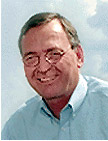(See Projects story on the
Composite
Truck Box.)
Where are you from?I was born in Syracuse, New York, and received my bachelor's degree from Norwich University in Vermont. Then I went on to RPI. I spent two years in the Army at a lab in Washington, DC, where I continued to develop my technical expertise before joining GM.
When did your interest in chemistry begin?
That goes back to a high school teacher who had a strong influence on me. I liked chemistry and did well in it. While I was in college, my organic chemistry professor encouraged me to go to graduate school. These people were like stepping stones, each helping me move on to the next phase of my life.
In the Army, I worked on adhesives and coatings, an area of focus that had marketable value in the commercial world. So I translated my organic chemistry knowledge into something useful.
Why did you choose GM R&D?
People expected me to take the traditional route and go to work for a chemical company. But I also interviewed at GM R&D - the weather was terrible here in Warren but the people were great. Going to work at GM just felt right. My wife and I agreed that I could always change if we didn't like it.
What were your early assignments?
I was hired to work on fundamentals of adhesives: Why do things stick together? After several years, I began work on a polyurethane windshield sealant. The project was quite successful and we earned some patents. The sealant never made it into production, but I learned a lot.
I also worked on a project to develop a replacement for lead solder to cover up joints on cars. Again, our team developed a material that exceeded all the specifications, but it didn't get used because the factory was more comfortable working with metal. Instead of our sealant, they found a non-lead-based metal to use.
How did your career continue?
I moved into management and led some projects where I did little technical work. But in recent years I've become more involved in research again, especially with work on the composite pickup box. I'm also heavily involved in the Automotive Composites Consortium.
What is your focus within the ACC?
We're working on lightweight composites, particularly carbon-fiber composite technology to reduce mass. It's the one material that would be lighter than aluminum in a body structure. But it's expensive, plus we have questions about durability and performance.
What excites you about your research?
I'm a research/analytical person at heart. I want to understand why things work. You collect data, conduct experiments, propose possibilities - in the end, you solve the problem. It's the discovery, the sense of accomplishment.
What do you consider your most significant accomplishment?
I have two. I worked with a group that won GM's Boss Kettering award in 1995 for low-cost tooling materials. We made a lot of tools and have licensed some. But now I find the sense of accomplishment from the composite pickup box equals that from winning the Boss Kettering award.
What is your typical day like?
I make myself available to my group first thing in the morning. I come in, get a cup of coffee, then talk over technical problems, answer questions, handle paperwork. Usually I attend a number of meetings, both technical and not. I really appreciate the efficient ones.
Other days I'm off-site. I often go to USCAR. I'm on the Board of Directors of the ACC and run a work group. Working with volunteers from other companies takes a large amount of time, to cultivate good working relationships and accomplish mutual goals.
What do you do when you're not working?
Golfing is my main hobby. My wife also has many projects for me around the house. I also like to read, particularly mysteries.
Your favorite vacation spot is England. Why?
We enjoy the lifestyle, the friendly people, sightseeing, spending time in the villages. In fact, we like it so much we plan to live there part of the year after we retire.




